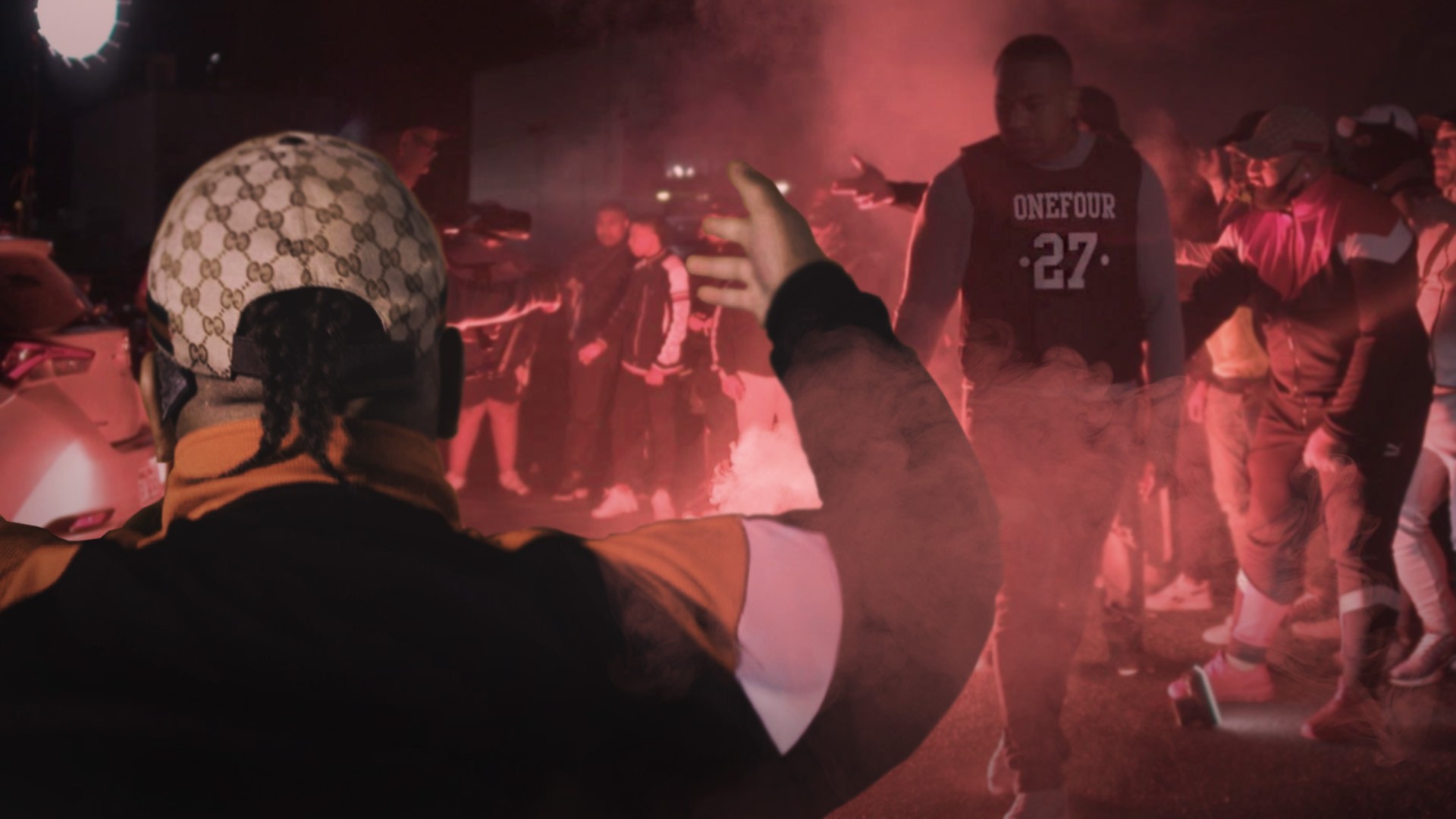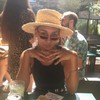Celebrated Drill Group ONEFOUR (Photo from Behind The Scenes With OneFour).
Earlier this week, The Daily Telegraph published an article detailing the NSW Police’s effort to remove drill and rap from various social media platforms and streaming services like Youtube and Spotify.Beneath a photo of Western Sydney rapper, Big Kash, NSW Police acting assistant commissioner Jason Weinstein told the paper that “drill music and songs (in some cases) are being weaponized to basically inflame a conflict.”“This is the third time the NSW Police have pressured the venue we were due to perform at and it’s getting fckn frustrating. They want us to get off the street, yet they won’t give us a chance to,” ONEFOUR said in a written statement to VICE in 2019.That same year, Sydney-based rapper, Huskii, said that police told him that if he were to perform it would be a breach of his bail conditions and ultimately be worthy of putting him back behind bars.“The police have made phone calls to all the venues I plan on working at in the future and told them they’ll be waiting there to arrest me on the night of the show,” Huskii wrote on Twitter.“It’s red hot how they are trying to stop Australian rappers at a time where the scene is making such an impact on culture.”Nick Lupi, manager for Australian artists like Triple One and Spanian, told VICE that while police and media attention might increase streaming numbers for artists in the short term, the pressure put on licensed venues and festivals hoping to book these artists created significant barriers for them to perform live. The end result: missing out on significant touring income and stunting their broader career growth.“I think the police and the law-and-order parrots in the tabloid press see an easy target in rap/drill because it’s easier to take a sledge hammer to this hugely popular form of music than it is to understand the nuances of music as a form of self-expression, and story-telling, that can reflect the lived realities of many within marginalised communities,” Lupi told VICE. Globally, police involvement in rap and hip-hop scenes has been almost constant, dating back to when the genre was popularised in the ‘70s, ‘80s, ‘90s and now. The examples are vast and varied. Groups like NWA were famously censored by the police throughout their career, and just last year police called for a boycotting of Snoop Dog’s halftime show at the Superbowl when they alleged that his recent track, “Police”, incited violence.In the UK especially, drill artists like Skengdo, AM and Digga D have been targeted for the contents of their lyricism. In 2019, both Skengdo and AM were sentenced to 9 months in prison for performing their song “Attempted 1.0” at a show in London the year before.Since 2015, the police in the UK also launched a specific taskforce, Operation Domain, to monitor Youtube videos that were described as inciting violence.In 2021, according to data obtained via Freedom of Information laws by VICE, 510 music videos were referred to Youtube, by the London Metropolitan Police, to be taken down. 96.7 percent of the time, the clips were removed.Now, it seems the NSW police force are looking to follow suit in what seems to be a targeted attack on a musical genre largely populated by black and minority voices.Lowkee, the manager of artists like Ay Huncho and Youngn Lipz, says he’s paid no time to the recent Daily Telegraph front page.“I’ve actually had no reaction at all, this doesn’t surprise me,” he told VICE.“I feel it’s got no weight. There’s no way this could ever happen, and if they did stop streaming platforms from playing this type of music, not only would they have to take off 90 percent of these rappers catalogue, but there’ll always be another streaming platform that will play it anyway. So I don’t think they could ever stop it, especially with the internet and moving into web 3.”The music is so influential, he says, that he understands why the police truly believe that there is some sort of negative impact. He uses TV shows like Underbelly as examples of other mediums that could be influential in shaping people's views on crime that aren’t monitored as heavily by the police. “For them, it’s a quick fix, it’s an easy fix, but it’s all words. There’s no real realistic strategy behind what they say. They’re just trying to put a bit of pressure on us,” he said.A statement from NSW Police to VICE said they “rely on the moderators of social media platforms to uphold their own policies around violent content.” “However, NSW police will take action in relation to content that contains material inciting violence of criminal activity.”If the NSW Police are successful in their attempts to moderate the drill and greater hip-hop scene in Australia, it could put significant barriers in place for artists to perform, grow their careers, make an income from their art and reflect the culture of their local suburbs.It seems that’s exactly what they’re trying to do, too.Correction: This story originally said that rappers Skengdo, AM, and Digga D were sentenced to 9 months in prison for performing “Attempted 1.0” at a show in London. This sentencing, in fact, only involved Skengdo and AM – Digga D was not involved. We regret the error.Follow Julie Fenwick on Twitter and Instagram.Read more from VICE Australia and subscribe to our weekly newsletter, This Week Online
Globally, police involvement in rap and hip-hop scenes has been almost constant, dating back to when the genre was popularised in the ‘70s, ‘80s, ‘90s and now. The examples are vast and varied. Groups like NWA were famously censored by the police throughout their career, and just last year police called for a boycotting of Snoop Dog’s halftime show at the Superbowl when they alleged that his recent track, “Police”, incited violence.In the UK especially, drill artists like Skengdo, AM and Digga D have been targeted for the contents of their lyricism. In 2019, both Skengdo and AM were sentenced to 9 months in prison for performing their song “Attempted 1.0” at a show in London the year before.Since 2015, the police in the UK also launched a specific taskforce, Operation Domain, to monitor Youtube videos that were described as inciting violence.In 2021, according to data obtained via Freedom of Information laws by VICE, 510 music videos were referred to Youtube, by the London Metropolitan Police, to be taken down. 96.7 percent of the time, the clips were removed.Now, it seems the NSW police force are looking to follow suit in what seems to be a targeted attack on a musical genre largely populated by black and minority voices.Lowkee, the manager of artists like Ay Huncho and Youngn Lipz, says he’s paid no time to the recent Daily Telegraph front page.“I’ve actually had no reaction at all, this doesn’t surprise me,” he told VICE.“I feel it’s got no weight. There’s no way this could ever happen, and if they did stop streaming platforms from playing this type of music, not only would they have to take off 90 percent of these rappers catalogue, but there’ll always be another streaming platform that will play it anyway. So I don’t think they could ever stop it, especially with the internet and moving into web 3.”The music is so influential, he says, that he understands why the police truly believe that there is some sort of negative impact. He uses TV shows like Underbelly as examples of other mediums that could be influential in shaping people's views on crime that aren’t monitored as heavily by the police. “For them, it’s a quick fix, it’s an easy fix, but it’s all words. There’s no real realistic strategy behind what they say. They’re just trying to put a bit of pressure on us,” he said.A statement from NSW Police to VICE said they “rely on the moderators of social media platforms to uphold their own policies around violent content.” “However, NSW police will take action in relation to content that contains material inciting violence of criminal activity.”If the NSW Police are successful in their attempts to moderate the drill and greater hip-hop scene in Australia, it could put significant barriers in place for artists to perform, grow their careers, make an income from their art and reflect the culture of their local suburbs.It seems that’s exactly what they’re trying to do, too.Correction: This story originally said that rappers Skengdo, AM, and Digga D were sentenced to 9 months in prison for performing “Attempted 1.0” at a show in London. This sentencing, in fact, only involved Skengdo and AM – Digga D was not involved. We regret the error.Follow Julie Fenwick on Twitter and Instagram.Read more from VICE Australia and subscribe to our weekly newsletter, This Week Online
Advertisement
The conflict they’re referring to, specifically, is the continued tension between two rival “gangs” in Sydney. The police have labelled the ongoing dispute the “postcode wars”. In the past year or so, both sides have allegedly been connected to 13 contract deaths.For the past few years, drill and rap groups from Western Sydney suburbs have been the target of multiple police crackdowns, and this recent effort is just one of many instances where authorities have tried to censor their music.Artists like the group ONEFOUR, who rose to global fame in 2019, have famously had shows derailed by the police after pressing venues and organisers to cancel their performances. ‘There’s a discomfort with the music and those that create the music,” Ricky Simandjuntak, ONEFOUR’s manager, told VICE.“Whether it’s because of where they're from on the socioeconomic scale or what they look like – because they’re black or brown kids. [It is also] because of the nature of how they see things, whether that’s frustration or anger. But it’s interesting that Nick Cave can release an album [Murder Ballads] about murder and that’s fine.”New South Police launched a focused effort to curtail rising gang violence in 2019, labelling it Strike Force Imbala. Twenty members of the police, including analysis experts and detectives aimed at targeting gangs, pressed organisers of an event where ONEFOUR – appearing as a support act for Octavian – were set to play.
Advertisement
Advertisement

Advertisement
Advertisement
